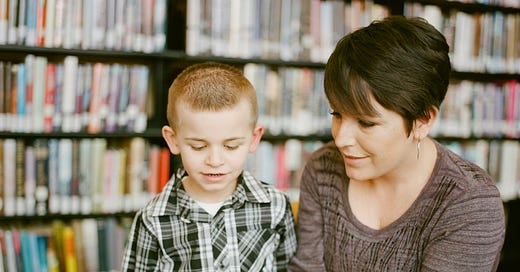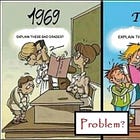Hello Bar-Setters,
As I alluded to in my last post, many parents of my generation have embraced a softer, child-led approach, believing that maximum choice and emotional validation will yield confident, happy adults.
Ask a parent today for their top parenting guidelines and many will tell you: to validate their child’s feelings. To never raise their voice. To always understand their child’s motivations and always convey support.
We’ve gone from “Because I said so” to “Let’s talk about how that made you feel.” This parenting style is often referred to as “gentle parenting.”
Marilyn Simon explains this well in her fantastic piece, The Cruelty of Gentle Parenting:
Gentle parenting, or conscious parenting, professes to foster compassion and emotional self-understanding in a child. It’s about respecting the emotions of a child and the motivations behind those emotions. If a child has a tantrum, hits, or generally misbehaves, it is because she is frustrated — and a parent’s job is to address the root cause of the child’s frustrations…
This all sounds quite nice and enlightened. But the truth is, it doesn’t raise happier kids.
It raises fragile ones. Anxious ones. Self-absorbed, entitled kids who lack the skills and inclinations to lead successful lives. I’ll explain why, but first…
Where Gentle Parenting Came From
The roots of gentle parenting trace back to Jean-Jacques Rousseau, who believed humans are born good and corrupted by society. As such, children do not need adult instruction and expectations so much as protection from adult influence.
This backwards idea has fueled many modern delusions: from communism, to the free love movement, to the belief that religion does more harm than good. In each case, the results have been disastrous. And now it has given us gentle parenting.
You can hear the echoes of Rousseau in Simon’s description of gentle parenting:
One can’t get angry with a child because he is not doing anything bad because he is inherently good. What is needed is to redirect his natural self-expression to a more socially accepted choice…
Instead of punishment, a child should face the “natural consequences” of her choices. For instance, if a child refuses to go to sleep, this means that she suffers the natural consequence of getting tired and cranky.
But, of course, this style of parenting actually shields kids from the real “natural consequences." If children are cranky, parents will naturally want to lose it on them. That’s good. Because if I’m cranky with my wife, she will want to lose it on me. Best to learn young that you can’t just go around being a crank every time you don’t feel great.
Why Gentle Parenting Fails
As I write in Chapter 2 of Setting the Bar:
Despite the Rousseau-inspired narrative that kids are all born with clear eyes, pure hearts, and a depth of perspective that has been beaten out of us wretched adults, the truth is that youth are mostly just shortsighted and impulsive. They have a very limited understanding of the world’s complexities and, quite naturally, feel an inflated sense of their own wisdom. Humility, nuance, and maturation tend to only follow lots of experience—lots of failure.
Kids aren’t born wise. They’re born needy. Sure, they are magically innocent, optimistic, and creative in ways that we all marvel at and hope they can maintain. But they also lack wisdom, perspective, discipline, and impulse control. They are extremely selfish and can be vicious when their will is thwarted. They need adults to impose structure—not as an act of dominance, but as an act of love.
Boundaries teach self-regulation.
Discipline teaches delayed gratification.
Consequences teach cause and effect.
When these are missing, kids grow into adults who expect the world to accommodate their emotions, rather than learning to manage them themselves.
Worse, they’re sent into a temptation-laden world with no defense against the compulsive habits that brilliant tech-designers work tirelessly to ingrain.
Parental reluctance to act as the authority their children need also explains why it's now normal for 10-year-olds to get smartphones and social media accounts. We all know it's bad for them. But authority-averse parents place their child’s immediate comfort above their long-term wellbeing.
The rise in adolescent anxiety and depression isn’t a mystery—it’s the predictable outcome of a culture that treats discomfort as pathology, rather than a natural part of growth.
In her book Bad Therapy, Abigail Shrier argues that modern adults have ceded authority to therapy culture, and that the results have been terrible for kids. As she says:
“Parents need to reclaim the power over their own children… Therapists don’t like this result, but again and again researchers have found that authoritative—but not authoritarian—parents raised both the most successful and the happiest kids.”
When authority is removed, children don’t become free. They become lost.
A child who never learned to follow rules won’t suddenly develop self-discipline at 18.
A teenager who never faced real consequences won’t suddenly become responsible in college.
A young adult who’s never been challenged won’t suddenly develop resilience in the workforce.
And a society where adults fail to authoritatively steward younger generations towards better values is one where young people remain cut off from essential wisdom and direction. It isn’t that this generation of young people is in need of correction, it is that every generation of young people is.
The fantastic Robert K. Henderson recently wrote about this last point:
What Kids Actually Need
If we want to raise confident, well-adjusted children, we need to reassert parental authority. Kids need:
Clear expectations
Firm boundaries
Adults who will say no and mean it
Authority isn’t about control. It’s about preparing kids for a world that won’t coddle them. It’s about teaching them that hard things are worth doing, that discomfort is part of life, and that lasting confidence is earned through effort. Most importantly, authority is about helping our children become good people. People with the capacity to be good fathers, mothers, husbands, wives, and citizens. People who will serve their communities, sacrifice for their families, and show up for their friends.
If we want to raise great people, we need to stop asking what they feel like doing—and start showing them what they’re capable of.
Thank you for reading and sharing!
If you enjoyed this, check out:
Also, I wanted to share a quote that I wish I’d included in my last post:
"For those who expect everything, there are many curses.
For those who appreciate everything, there are many blessings." —James Clear
Shane







Great stuff Shane! Loved the quote at the end: "For those who expect everything, there are many curses. For those who appreciate everything, there are many blessings." —James Clear
Valuable lessons that Shane learned from all the times he was cranky with his wife :)